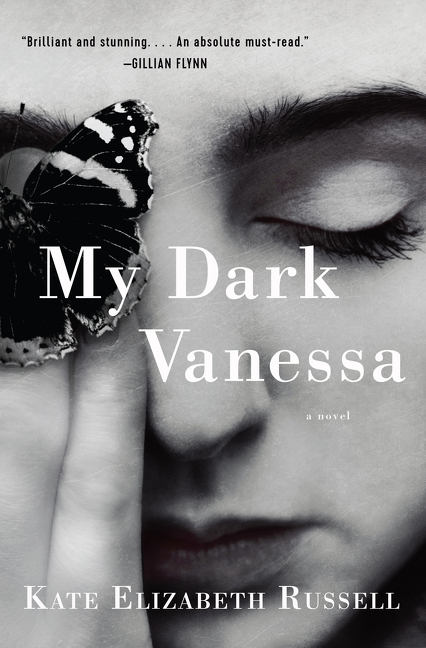In the intricate landscape of contemporary literature, few narratives command attention quite like Kate Elizabeth russell’s “My Dark Vanessa.” This provocative debut weaves a complex tapestry of trauma, memory, and the haunting intricacies of a student-teacher relationship, exploring the shadows that linger long after the spotlight fades. In “Exploring the Shadows,” we embark on a thoughtful reflection that delves into russell’s nuanced portrayal of Vanessa Wye—a character caught in the throes of her own conflicting emotions, grappling wiht the impact of an insidious bond that reshapes her understanding of love and manipulation.As we navigate the rich depths of Russell’s prose, this review seeks to illuminate the themes of agency, isolation, and the echoes of the past that resonate throughout the novel, inviting readers to consider not only the story itself but its broader implications in a world still grappling with similar tales of power and vulnerability.
The Complex Tapestry of Consent and manipulation
Within the intricate narrative of “My Dark Vanessa,” the boundaries of consent blur, revealing a landscape where manipulation lurks subtly in the shadows. The protagonist’s experiences highlight the weighty complexities of personal agency and the ways societal structures can distort one’s sense of autonomy. Characters are drawn with precision, illustrating how a seemingly consensual relationship can be steeped in emotional coercion and power dynamics. This interplay raises critical questions about perceived consent, particularly when intertwined with manipulative tactics that can lead individuals to second-guess their own feelings and experiences.
It is pivotal to recognize the emotional entanglements that complicate our understanding of consent; for instance, the influence of grooming techniques can create a veneer of mutual agreement while, underneath, existing are layers of psychological control.This precarious balance prompts a deeper examination of accountability—both personal and institutional.Readers may find their perspectives challenged as they navigate the gray areas between affection and exploitation, leaving them to ponder the following components:
- Power Dynamics: How age and experience can shape relationships.
- The Role of Trust: When does trust become a tool of manipulation?
- Societal Expectations: The pressure to conform to narratives of romantic love.
The intricate constructs of consent in “my Dark Vanessa” serve not only as a reflection of personal trauma but also as a critique of broader societal norms surrounding relationships. Through its unflinching portrayal of manipulation, the narrative compels readers to dissect their own beliefs about consent and to acknowledge the consequences of blurred boundaries; an intellectual exercise vital to understanding the stakes involved.
Best-Selling Books in This Category
A Deep Dive into Character Development
In Kate Elizabeth Russell’s My Dark Vanessa, character development serves as both a lens and a mirror, reflecting the complexities of trauma and manipulation. The protagonist, Vanessa, is intricately crafted, evolving from a seemingly naive adolescent into a woman grappling with the suffocating shadows of her past. This transformation is not linear; rather, it ebbs and flows with the revelations of her memories and the weight of her experiences.Russell employs a strategy of rich internal dialogue and intersecting timelines to unveil Vanessa’s psyche, creating a profound sense of intimacy between the reader and her internal struggles. Through Vanessa’s perspective, we witness the toxic entanglement between victimhood and agency, deftly challenging our understanding of consent and the lingering ramifications of abuse.
The supporting characters in Vanessa’s life further enhance her development, particularly her predator, Mr. Jacques. His duality serves to accentuate Vanessa’s confusion, as he oscillates between a doting mentor and a manipulative figure. The depiction of their relationship invites readers to examine the notions of grooming and self-deception, allowing for a deeper exploration of how relationships can warp one’s sense of self. in juxtaposition to Vanessa’s narrative, a table highlighting key supporting characters reveals the multifaceted dynamics at play:
| Character | Role | Impact on Vanessa |
|---|---|---|
| Mr. Jacques | Mentor and Abuser | Confusion of love and manipulation |
| Grace | Friend | Representing normalcy and support |
| Vanessa’s Parents | Foils | Displays neglect and misunderstanding |
This examination of character development not only enriches the reading experience but also forces us to confront uncomfortable truths about human relationships. Russell’s deft construction of these personalities creates an atmosphere of tension and empathy, ensuring that the narrative resonates long after the final page is turned.
The Echoes of Trauma: resonance in Vanessa’s Journey
in the intricate tapestry of Vanessa’s journey, the reverberations of past trauma shape her every thought and action. The weight of these experiences creates a dissonance that resonates throughout her life, echoing in moments of both clarity and confusion. Her struggle to define the boundaries between victimhood and complicity unfolds in haunting detail, revealing a young woman’s internal conflict as she grapples with the complexities of her relationship with her teacher. This nuance is crucial; it is not just the act of trauma that defines Vanessa, but the lingering effects that color her perceptions of herself and her worth. As she navigates her memories, we see how deeply rooted pain can distort one’s reality, leading to a search for validation that often comes at a cost.
The effects of this trauma manifest not only in Vanessa’s personal life but also in her interactions with the world around her. Key themes emerge from her experiences:
- Isolation: Her journey reveals increasing separation from those who might offer understanding.
- Manipulation: The lingering influence of her abuser complicates her ability to trust others.
- Agency: The struggle for self-empowerment against the backdrop of manipulation and trauma.
A closer examination of vanessa’s character leads to a deeper understanding of how trauma resounds through time, reframing her narrative as one not solely of victimhood, but of an ongoing struggle for voice and identity. In essence, her story mirrors a broader commentary on the societal discourse surrounding abuse and the frequently enough-overlooked psychological scars that accompany it. It challenges readers to confront uncomfortable truths about the nature of power dynamics and the silent battles waged within the mind, leaving an indelible mark on Vanessa’s psyche that lingers long after the initial pain has faded.
narrative Structure and Its Impact on Reader Engagement
The intricate tapestry of narrative structure in “my Dark Vanessa” serves as a powerful vehicle for reader engagement,leading us through the complex emotional landscape of its protagonist. The dual timelines and intertwining voices create a rich, immersive experience that invites readers to grapple with the weight of Vanessa’s trauma and the perils of manipulation.The author deftly utilizes a non-linear narrative, creating suspense and encouraging readers to question their perceptions of memory and truth. This fragmented storytelling mirrors Vanessa’s own fractured psyche, making the journey through her memories both haunting and compelling.
Moreover, the use of vivid imagery and introspective prose enhances the emotional resonance of the narrative. Each chapter is laden with symbolic elements that resonate deeply with the themes of power and vulnerability, which keeps readers invested in Vanessa’s plight. By employing techniques such as foreshadowing and unreliable narration, the story challenges readers to examine their own assumptions about right and wrong, affection and coercion. The following table summarizes key elements that contribute to the narrative structure and their impact on reader engagement:
| Element | Impact on Engagement | |
|---|---|---|
| Dual Narratives | Enhances suspense and deepens understanding of character. | |
| Imagery | Evokes strong emotional responses and visual connections. | |
| Introspection | Fosters a sense of empathy and personal reflection. | |
| Foreshadowing | Builds tension and keeps readers guessing. | |
| Unreliable Narration | Encourages critical thinking and multiple interpretations. |
The role of Memory in Shaping Identity
The intricate dance between memory and identity reveals itself through the lens of trauma and healing in Kate Elizabeth Russell’s ‘My Dark Vanessa’. As Vanessa navigates her tumultuous past, the fragmented recollections of her relationship with her teacher weave a complex tapestry that both shapes and distorts her sense of self. Memories serve as both a sanctuary and a prison; they encapsulate moments of fleeting joy intertwined with profound pain. This duality highlights how memory can carve deep grooves in our identity, often dictating how we view ourselves and our place in the world. In this light,the selective nature of memory not only influences personal narratives but also plays a critical role in the construction of identity,revealing the ever-present debate between victimhood and agency.
Through Vanessa’s journey, Russell invites readers to consider the recollections we hold dear and the ones we wish to forget. the impact of these memories extends beyond individual experience, creating ripples that affect relationships and societal perceptions. Key aspects of memory’s role in shaping identity include:
- Selective Recollection: The mind’s tendency to highlight certain experiences while suppressing others can considerably alter self-perception.
- Contextual Influence: how memories are framed within larger narratives informs the interpretation of one’s identity.
- Trauma Retelling: Engaging with painful memories can either fortify identity or lead to cyclical patterns of distress.
| Memory Type | effect on Identity |
|---|---|
| Positive Memory | Affirms self-worth and agency |
| Negative Memory | Creates doubt and insecurity |
| Distorted Memory | Obscures true self-perception |
Exploration of Female Agency and Power Dynamics
The narrative in Kate Elizabeth Russell’s My Dark Vanessa serves as a powerful lens through which to examine the complexities of female agency within a web of disturbing power dynamics. Vanessa, the protagonist, grapples with her tumultuous relationship with her teacher, provoking readers to consider the nuanced interplay between victimhood and agency. This duality is exemplified in her conflicting emotions: the allure of empowerment derived from her perceived autonomy clashes painfully with the oppressive reality of manipulation and betrayal. This psychological tug-of-war encapsulates a worldwide theme where societal expectations, personal agency, and subservient roles intersect, creating a fertile ground for deep exploration.
Russell masterfully crafts a narrative that defies simplistic binaries, inviting us to reflect on how society often positions women at the mercy of powerful figures, yet simultaneously explores the undercurrents of resistance inherent in their experiences. Through Vanessa’s introspective journey, we observe how internalized perceptions of worth and desire can serve to undermine personal power. This complexity is mirrored in her interactions with other female characters, forming a tableau that contrasts competing notions of strength, vulnerability, and solidarity. By shedding light on the intricate layers of women’s lived experiences, the novel challenges readers to reconsider their understanding of agency amid oppressive structures, posing critical questions about betrayal, consent, and the shadows that linger long after the physical scars have faded.
Interrogating Society’s Complicity in Abusive Relationships
In examining the intricate layers of complicity that permeate abusive relationships, Russell’s narrative sheds light on how societal attitudes can enable harm.the characterization of Vanessa’s experience raises critical questions about institutional silence and cultural normalization of predatory behavior. Readers are confronted with the uncomfortable reality that, more often than not, the systems meant to protect individuals fail them. This complicity manifests in various forms:
- Judgmental norms: Society tends to place the onus of relationships on victims, often questioning their choices instead of condemning the abuser.
- Education systems: The failure of educational institutions to address power imbalances contributes to environments where exploitation can thrive.
- Silencing dialogues: The stigma surrounding discussions of consent and abuse can silence victims, trapping them in cycles of abuse.
Moreover, russell’s work prompts a deeper examination of how the surrounding community often unwittingly sustains these harmful dynamics. One must consider the role of bystanders who witness the dynamics of an abusive relationship yet choose not to intervene. Analyzing their hesitance reveals a complex web of societal pressures that deter meaningful action.A contrasting table below illustrates the psychological barriers faced by potential allies versus the empowering steps they can take:
| Barriers to Action | Empowering Actions |
|---|---|
| Fear of social backlash | Educate others on consent and support networks |
| Uncertainty about the abuser’s intentions | Offer a listening ear to the victim without judgment |
| Belief that it’s a private matter | Raise awareness about the prevalence of abuse in society |
Symbolism and Imagery: Defining Moments in the Text
In ”my Dark Vanessa,” symbolism and imagery serve as powerful tools that deepen the reader’s understanding of trauma, complicity, and the struggle for self-identity. One striking symbol is the recurring presence of shadows, which represent the lurking effects of Vanessa’s past and the influence of her abuser. The shadows encapsulate her internal conflict, illustrating how the echoes of the traumatic experience shape her perceptions and relationships. This imagery creates a visceral sense of entrapment, as Vanessa frequently enough feels haunted by the decisions she made, casting doubt on her truths and memories.
Additionally, the use of mirrors throughout the text speaks to themes of reflection and distorted self-image. Mirrors not only offer a literal reflection of Vanessa’s physical self but also highlight the broader theme of how she views her own identity through the lens of her traumatic experiences. This motif can be dissected as it plays into the book’s duality of innocence and guilt, showcasing a character torn between the façade of her life and the darkness she grapples with.Below is a table that summarizes some key symbols and their meanings:
| Symbol | Meaning |
|---|---|
| Shadows | Haunting memories and trauma |
| Mirrors | Self-reflection and identity distortion |
| books | Knowlege, escape, and manipulation |
The Emotional Weight of Language and Dialogue
Language in “My dark Vanessa” serves as a double-edged sword, wielding the power to connect and divide. Through the nuanced dialogues between Vanessa and her teacher, Russell artfully captures the complexity of their relationship, enveloping it in layers of manipulation and affection. This interplay reveals how words can forge bonds or shatter trust, reflecting the intricate dance of vulnerability and control. The dialogue resonates with a haunting familiarity, offering a glimpse into the internal struggles of the characters where perception and reality often clash. Each conversation drips with emotional weight, deftly illustrating the power dynamics at play, as Vanessa grapples with her distorted perceptions of love and betrayal.
Moreover, the emotional burden of language is palpable as vanessa navigates her memories, tethered to the past through the very words that once comforted her.The repetition of certain phrases becomes a haunting echo, signifying her entrapment and the lingering trauma that shapes her identity. Within these passages, readers are drawn into an unsettling reflection on how language reflects intimacy and isolation alike. It raises critical questions about the implications of dialogue—both the healing potential of open communication and the devastating echoes that silence can leave behind. In this poignant exploration, Russell challenges us to confront the shadows cast by our words and the profound impact they can have on one’s emotional landscape.
Cultural Commentary: Reflections on Feminism and #MeToo
In “my Dark vanessa,” Kate Elizabeth Russell delves into the complexities of consent and memory, igniting a critical discourse around the nuances of victimhood and agency that resonate deeply with contemporary feminist narratives. Through the lens of Vanessa, a character caught in the web of a manipulative relationship with her teacher, the novel compellingly examines the blurred boundaries between love and abuse. This portrayal encourages readers to confront uncomfortable truths about the power dynamics that often underpin such relationships, extending beyond mere personal tragedy to question societal perceptions around consent. Key themes emerge, urging a reconsideration of how we define maturity, autonomy, and the sometimes murky waters of consent.
Furthermore, the book serves as a stark reminder of the ongoing relevance of the #MeToo movement, shedding light on the stories that are often left in the shadows. As Vanessa’s narrative unfolds, the intersectionality of trauma and societal expectations come into play, raising questions about cultural accountability and the consequences of silence. the stories of survivors must be amplified, yet Russell’s work also emphasizes the complexity of these narratives—often marred by shame and misinterpretation. In this light, “My Dark Vanessa” not only contributes to a richer understanding of feminism in the modern age but also acts as a catalyst for ongoing dialogue about healing, identification, and the long road toward justice in a world that frequently mislabels victimhood.
| Key Themes | Description |
|---|---|
| Blurred Lines | The struggle between love and abuse,and the complexity of consent. |
| Agency and Voice | The importance of agency in narratives of victimhood. |
| Cultural Accountability | Questioning societal perceptions around consent. |
| Healing Journeys | Exploring the path to recovery and acknowledgment of past trauma. |
The Importance of Perspective and Voice
In “My Dark Vanessa,” Kate Elizabeth Russell masterfully crafts a narrative that delves into the complex interplay of victimhood and agency through the lens of a young girl’s perspective.The protagonist’s voice is both haunting and captivating, as it navigates the murky waters of consent and memory. Russell’s choice to present Vanessa’s story invites readers to engage deeply with the emotional turmoil and psychological conflicts inherent in her experience. by centering Vanessa’s perspective, the novel compels us to consider the multifaceted nature of truth and how our voices can shape, distort, or affirm the realities we inhabit.
the varying perspectives of characters surrounding Vanessa further enrich the narrative, creating a choir of voices that reflect society’s often conflicting views on abuse and trauma. These contrasting opinions not only highlight the isolation Vanessa faces but also reveal the societal pressure to conform to specific narratives regarding sexual misconduct. Key elements that enhance this exploration include:
- Inner Monologue: Vanessa’s thoughts provide an intimate glimpse into her struggles.
- Dialogue: Conversations with other characters illustrate societal attitudes and responses.
- Flashbacks: these moments contrast past and present, shaping Vanessa’s current identity.
Through these narrative choices, Russell encourages readers to bear witness to Vanessa’s journey, inviting reflection on their own understanding of victimhood and empowerment. the potency of perspective and voice is, thus, not merely a literary device but a crucial aspect of human experience, urging us to listen and empathize with those who dwell in shadows.
Stylistic Choices: crafting an immersive Experience
Russell’s prose is a delicate dance between clarity and nuance, allowing readers to plunge into the depths of Vanessa’s psychological turmoil. Through shifting perspectives and non-linear timelines, the narrative weaves a complex tapestry that mirrors the chaotic nature of trauma and memory. The author employs a rich palette of sensory details that evokes the environment and emotions, drawing readers closely into Vanessa’s world—every scent, sound, and shadow serves to deepen the immersive experience. This intricacy is not merely stylistic; it reflects the fragmented reality Vanessa grapples with, urging readers to experience her internal conflict in visceral ways.
Furthermore, the interplay of light and darkness throughout the novel enhances its thematic resonance. Russell utilizes stark contrasts to symbolize the duality of Vanessa’s experiences—moments of clarity amidst the chaos and the suffocating weight of repression. The subtleties of dialogue are crafted to reveal hidden truths, with characters often embodying ambiguous morality that challenges conventional perceptions of love, power, and victimhood. By infusing the narrative with such stylistic choices, Russell invites readers to confront their own understandings of complicity and contradiction, crafting a haunting experience that lingers long after the last page is turned.
Understanding the Nuances of Russell’s Inspiration
In delving into the intricacies of Kate Elizabeth Russell’s “My dark Vanessa,” one cannot overlook the layered inspiration derived from literary giants like Vladimir Nabokov. The serpentine complexity of relationships depicted in Russell’s narrative echoes the themes of manipulation and obsession found in Nabokov’s “Lolita.” This connection underlines how literature frequently enough reflects societal issues,forcing readers to confront uncomfortable truths. through astute character development, Russell encapsulates the duality of victimhood and power, allowing for a discourse that is both unsettling and necessary.
Russell’s prose is laced with poignant observations, challenging traditional narratives surrounding traumatic experiences. By presenting Vanessa’s internal world as both a sanctuary and a prison, she invites readers to explore several critical topics:
- The interplay of memory and reality: How do our recollections shape our identities?
- The portrayal of power dynamics: What does it mean to wield influence in a relationship?
- Societal complicity: In what ways does society fail to protect its most vulnerable members?
In fostering an environment for reflective thought, Russell doesn’t just retell a story; she reframes the narrative, compelling her audience to examine the ethical frameworks surrounding consent and personal agency. This nuanced approach serves as a catalyst for deeper conversations about the implications of our perceptions, thereby expanding the literary scope of contemporary discussions on trauma and recovery.
The Pen Behind the Page: A Closer Look at Kate Elizabeth Russell
Kate Elizabeth russell, a voice distinctively attuned to the complexities of trauma and consent, weaves narratives that resonate with haunting realism. In ‘My Dark Vanessa’, she presents a delicate yet powerful examination of a troubling relationship between a student and her teacher, navigating the murky waters of memory and manipulation. Through her nuanced characterization and evocative prose, Russell challenges readers to confront uncomfortable truths about power dynamics and the lingering shadows of the past. Her work encourages introspection, prompting us to consider how personal experiences shape our understanding of morality and autonomy.
The depth of Russell’s storytelling lies not just in the unfolding drama but in her ability to capture the emotional landscapes of her characters. Readers are drawn into Vanessa’s world, feeling the weight of her internal struggles and the societal pressures that complicate her reality. Russell employs a subtle yet impactful writing style, often utilizing literary techniques such as:
- Rich Symbolism: Objects and settings that amplify themes of confinement and liberation.
- Vivid Imagery: Descriptions that immerse readers in Vanessa’s psychological journey.
- Non-linear Narrative: Shifting between past and present to mirror the chaos of Vanessa’s thoughts.
as we analyze Russell’s exploration of trauma, we find that her pen not only illuminates individual experiences but also bridges broader conversations about accountability and recovery within society. Her narrative resonates deeply, inviting a critical examination of the systems that allow such relationships to exist while simultaneously providing a lens through which readers may reflect on their own understanding of consent.
The Conclusion
As we close the pages on “Exploring the Shadows,” the echoes of Kate Elizabeth Russell’s “My Dark Vanessa” linger in the air, leaving behind a complex tapestry of emotions and reflections. Russell’s nuanced exploration of trauma, power dynamics, and the intricacies of memory compels us to confront uncomfortable truths that frequently enough hide in plain sight. This review serves not merely as an examination of a story but as an invitation— to listen, to reflect, and to acknowledge the shadows that too frequently go unspoken.
In a world where conversations about consent and agency are more important than ever, “My Dark Vanessa” challenges us to question our perceptions and assumptions. It encourages a deeper understanding of the human experience, revealing that beneath the surface, the journey through pain and resilience is profoundly intricate.
So, as you set this book down, consider the conversations it inspires and the shadows it illuminates. Literature, after all, thrives on its ability to resonate and provoke thought long after the final line is read. In wrestling with Vanessa’s story, we are reminded of our shared humanity and the power of narrative to bring light to the darkest corners of our existence. Ultimately, it is through our engagement with these stories that we can truly begin to understand ourselves and each other.












